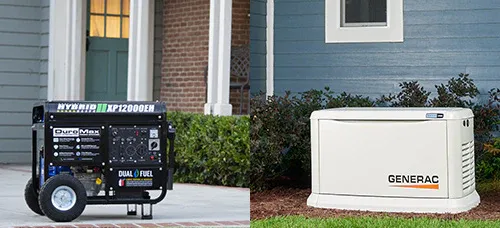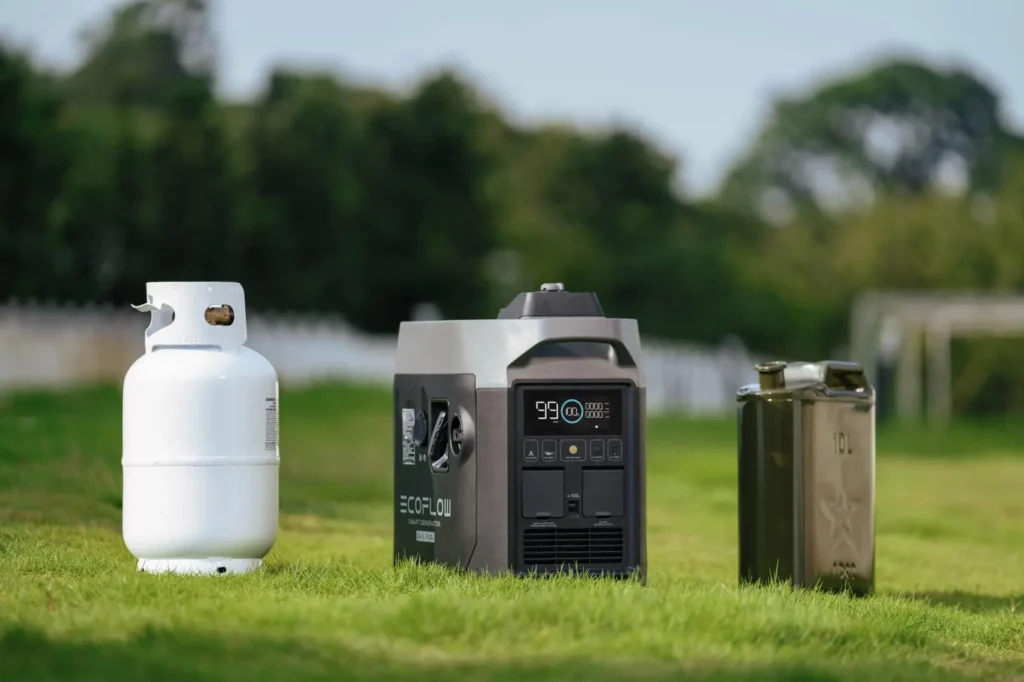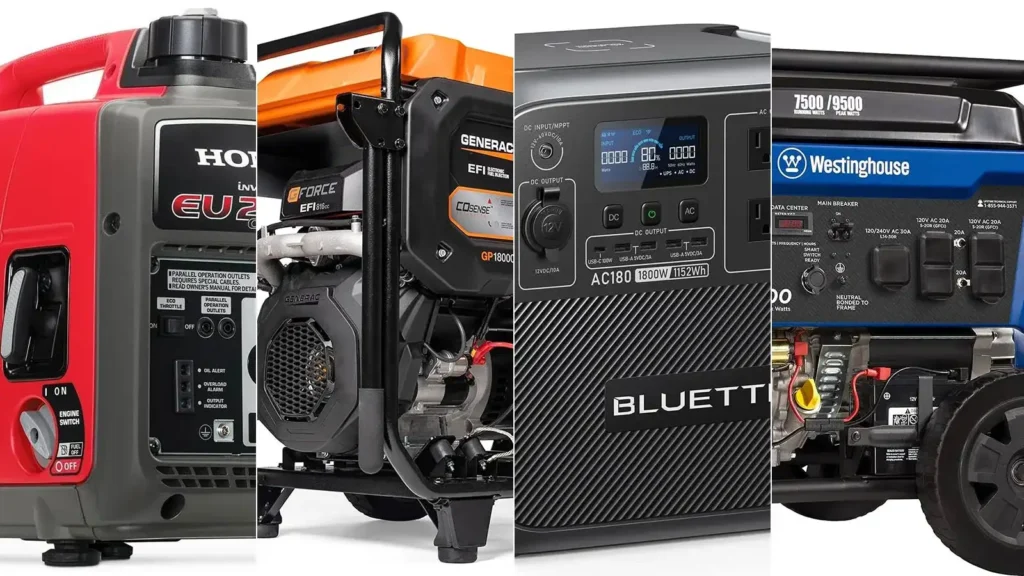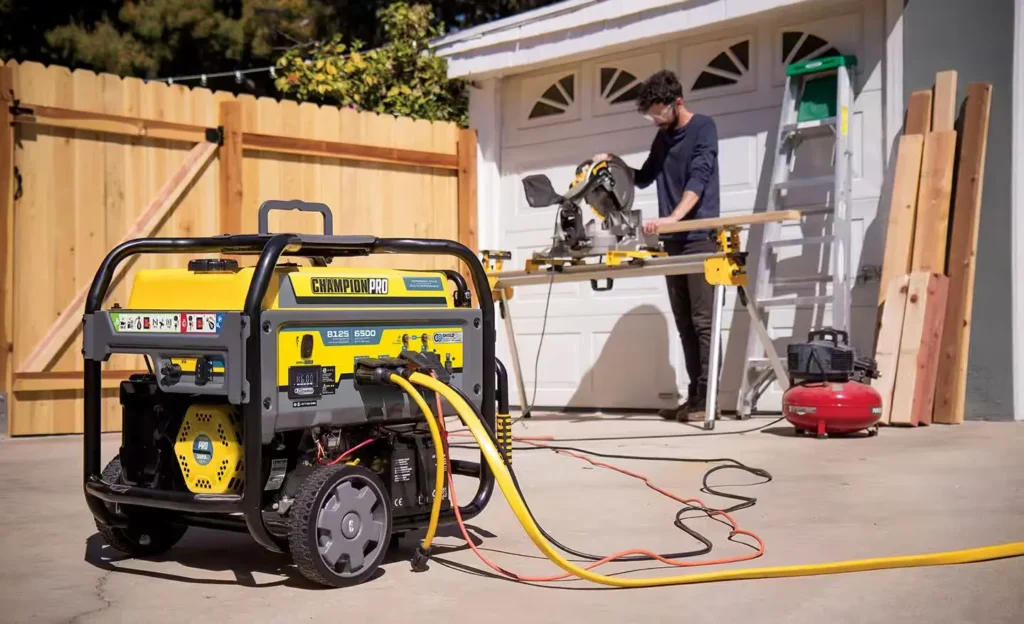When the power goes out, a generator is more than a backup – it is a critical safeguard for your home. At Grounded Electric, our licensed electricians help families evaluate their options for safety, comfort, and reliability.
Whether this is your first generator purchase or an upgrade, this guide explains how to choose a generator for your home with practical steps and expert insight.
The best way to choose a generator for your home is to match your power needs with the right type. Start by listing what you need to run in an outage. Add up the wattage.
Compare portable generators for short use or standby units for whole-house coverage. Then look at fuel type, transfer switches, and safety rules. By doing this, you’ll know how to choose a generator for your home that works safely and meets your needs.
Key Takeaways
-
- The right generator depends on how much power you need, what fuel you use, and if you want full or partial home backup.
-
- Standby generators turn on by themselves and cover your whole house, while portable models cost less but need setup.
-
- Sizing is key – check appliance wattage and plan for upgrades like central air or EV chargers.
-
- Transfer switches, fuel type, and local rules must be handled by a licensed electrician.
-
- Good brands, safe storage, and regular service keep your generator reliable for years.
Generator Types and Key Differences
When deciding how to pick a generator, it helps to understand the main categories available. The most common types of generators are standby, portable, and inverter units. Each offers different levels of power, cost, and convenience.
Standby vs. Portable Generators
The two most common types of generators for residential use are standby and portable models. A home standby generator connects directly to your electrical panel and automatically activates when the power grid fails, providing uninterrupted backup power for the entire house.
A portable generator is smaller, requires manual setup, and usually powers only selected appliances through cords or a transfer switch. Choosing a backup generator depends on your budget, installation requirements, and the level of coverage you expect during an outage.

What Is the Best Generator for the Home?
The best generator for the home depends on your specific needs, not one single brand. Focus on total power requirements, runtime, and how well it matches your existing power source.
Reliable options like Generac, Honda, and Champion stand out for consistent performance and safety. A Generac home standby generator is ideal for full-house coverage, while a Honda inverter generator offers quiet, efficient backup power for smaller spaces.
What Generator Is Better Than Generac?
Generac is a well-known name in the market, but it is not the only strong choice. Brands such as Kohler, Briggs & Stratton, and Champion also produce highly rated units with different strengths. For instance, Briggs & Stratton generators are often praised for their quiet operation and long-term dependability, while Kohler models are valued for strong surge performance.
When weighing options, it is important to compare not just power ratings but also long-term service support, warranty coverage, and the availability of parts – especially if you rely on the generator for critical emergency power.
Best Generator for Home Backup Power and the Money
Westinghouse and Champion give good backup power for less. They cost less than big standby units but still work well for outages.
Pick one that is fuel-efficient, reliable, and easy to service. A solid mid-range model can save you money long term.
How to Choose the Right Size Generator
What Size Generator Is Needed to Power My House?
Picking the right size stops overloads and keeps your home safe. Small units may cover a sump pump, fridge, and lights. Larger ones can run central air, laundry, and more.
Most homes need 7,500–20,000 watts, depending on square footage and appliance load. If unsure, Grounded Electric can size your system for you.
Sample Appliance Wattage Guide
Use this to check your power requirements before choosing a unit.
Estimate Wattage and Load Requirements
List the items you need during an outage. Add their running watts. Then check if they need extra starting power.
Always add a 15–20% buffer so the generator runs smoothly. This is how to choose a home generator that meets both current and future needs.
How Load Management Helps You Use a Smaller Generator
A load manager cycles heavy items so only one or two run at a time. For example, your AC can pause while the water heater runs.
This lowers the peak load and may let you buy a smaller unit. It also helps keep the system fuel-efficient.
Fuel Type, Transfer Switches, and Setup
Fuel Options: Propane, Gasoline, Natural Gas
Fuel type plays a major role in performance, cost, and convenience. Natural gas is often preferred for generator installation because of its steady supply through utility lines. Propane is clean-burning and has a long shelf life, making it ideal for long-term storage.
Gasoline is widely available but requires careful handling and regular replacement. Many homeowners also compare diesel vs propane generators when considering fuel options.

Fuel Type Comparison: Pros and Cons
Understanding Transfer Switches
Transfer switches keep your generator safe from the grid. They stop dangerous backfeed and protect workers.
Manual switches work with portable units. Automatic switches pair with standby units. These must be installed by a licensed electrician.
How to Select a Generator for Your Home
Think about noise level, warranty, service, and smart features like remote monitoring.
Our co-owner, Barret Abramow, says, “Choose a model that fits today and future upgrades, like EV chargers or home additions.”
Generator Cost Ranges by Type
The generators range in price and features depending on type:
-
- Portable Generator: $500 – $2,000
-
- Inverter Generator: $800 – $3,000
-
- Home Standby Generator: $2,500 – $7,000 (plus install)
-
- Install Costs: $2,000 – $5,000 for permits, site prep, and fuel lines
Value comes from safe installs, strong brands, and long-term support.
Generator Installation and Safety
How to Set Up a Generator for Your Home or House
Installing a generator takes planning. Standby units need a pad, fuel hookup, and panel wiring. Portable units must sit outdoors, away from doors and windows, with safe cords.
The wrong setup risks fire or carbon monoxide. Grounded Electric handles installs to meet all codes.
What Are the Disadvantages of a Generac Generator?
Generac models can be noisy, and parts may take time to arrive. If you’re unsure about this brand, you may ask are Generac generators are worth it before making a final decision.
Compare reviews, service speed, and cost before choosing.
Safety Clearances, Permits, and Code Compliance
Generators must sit at least 5 feet from openings. Many installs need permits and inspections.
Our head electrician, Robert “Bobby” Mulholland, with 30+ years of experience, makes sure every system is tested and safe.
Best Brands and Reliability
What Is the Most Reliable Home Generator Brand?
Brands like Kohler, Cummins, Generac, and Briggs & Stratton are proven. Pick models with strong cases, long run times, and good service networks.
A home standby generator from a trusted brand keeps your home ready when the power grid fails.

Best Whole House Generators – Consumer Reports
Consumer Reports ranks Kohler and Generac highly. Features like fast startup, smart load control, and Wi-Fi tracking are top-rated.
Best Portable Generator Options
Inverter generators like Honda or Westinghouse are quiet, light, and safe for electronics. They’re fuel-efficient and great for short outages. For larger systems, many users also compare diesel electric generator efficiency to understand long-term operating costs.
Maintenance and Long-Term Ownership
How Often to Service Your Generator
Change oil, replace filters, and test under load on schedule. Most standby units need yearly checks or after 100–200 hours.
Grounded Electric offers service plans to keep units running.
Common Issues and Troubleshooting Tips
Battery failure, clogged filters, and stale fuel are common. Run the generator monthly for 20 minutes to keep it ready.
This keeps house generators reliable and ready for emergency power.
Final Tips
How Do I Choose a Generator?
To answer how I choose a generator: define your needs, compare wattage, and decide on type and cost.
A licensed installer will help avoid safety risks.
First-Time Buyer Tips and Cost Planning
Before you buy, ask:
-
- How many circuits should be covered?
-
- Do I want Wi-Fi or remote start?
-
- What is the total budget?
Expect $3,000–$12,000 depending on type and setup. Working with Grounded Electric prevents hidden costs. Call Grounded Electric today to get a tailored load plan and a clear, itemized quote.



